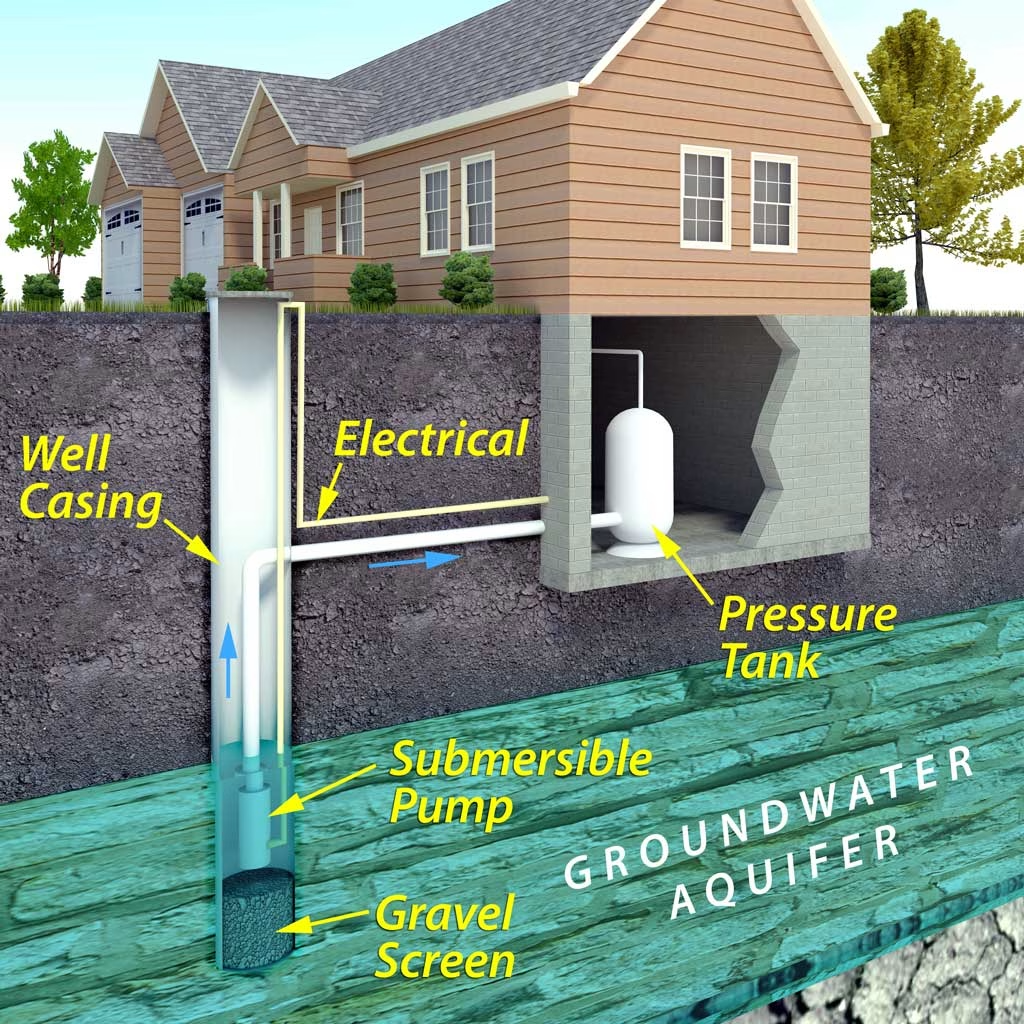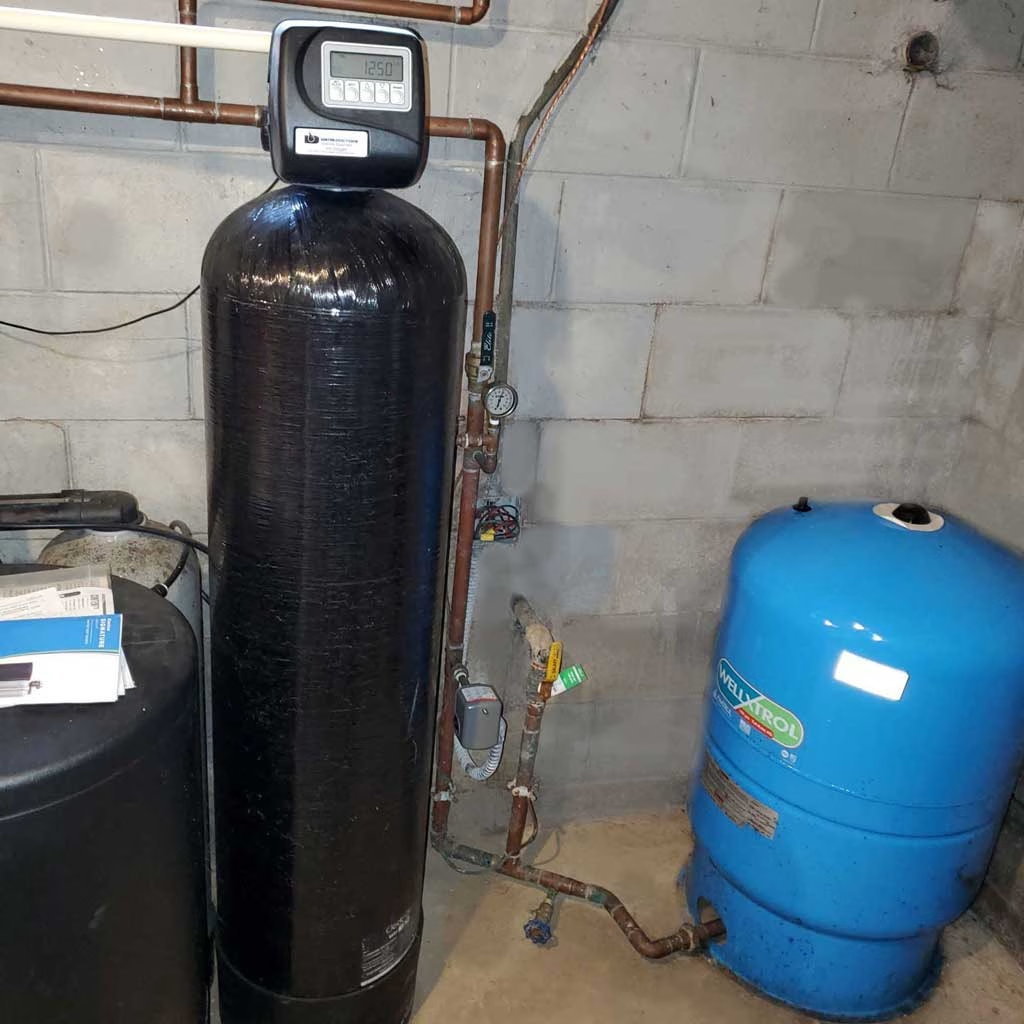
Treatment Services for Well Owners
Untreated well water can contain iron, sulfur, bacteria, and other contaminants, but Water Doctors can help. Give your family soft, quality water that keeps them healthier and happier. Our multi-stage treatment process is custom-designed around your water’s unique makeup, eliminating harmful substances while making your water smell and taste great.
For more specialized needs, we proudly partner with Water Diagnostics and 4-D Water Well & Pump Service. Water Diagnostics offers comprehensive testing for arsenic, bacteria, nitrates, and other potential contaminants, particularly useful for real estate transactions and ensuring your water meets safety standards. Meanwhile, 4-D Water Well & Pump Service handles all aspects of well and pump maintenance, ensuring your well equipment operates efficiently and reliably. Together, we ensure your well water is as safe and clean as possible, with every aspect of your system expertly managed.

Advice for First-time Well Owners
If you’re new to owning a private well, transitioning from municipal water to well water can feel daunting. Don’t be afraid! Trust the Water Doctors team to keep you “well” aware. Our tips for new homeowners:
- When purchasing, check toilet tanks and shower heads for stains and mineral deposits
- Consider writing a third-party water test into your offer (we’d be happy to help!)
- Choose whether to buy or rent equipment
- Get your equipment inspected and your water tested annually
- Enjoy unfettered access to your private water supply!
Frequently Asked Questions
A water softener does not put salt into the water.
It merely exchanges calcium ions in the water for sodium or potassium ions. The amount of sodium or potassium coming through in soft tap water is extremely low. For example, in 10 grain hard water, the amount of sodium in an 8 ounce glass of soft water is typically equivalent to the sodium in one slice of white bread. Soft water, by dietary standards, would be considered a “low sodium” beverage. Consumers may use potassium as a regenerant if they prefer not to clean out the system with sodium. Be sure to check on the efficiency of the water softener before using potassium as it is higher priced and 25% less efficient than sodium as a regenerant.
Over 85% of the United States has hard water. Since hardness is really dissolved rock, the average family of four will have more than 15 pounds of rock per year in their water for each grain of hardness.
These mineral deposits in your home from hard water can:
- Ruin water bearing appliances (cutting the life of washing machines, dishwashers, and hot water heaters by up to 50%)
- Increase energy costs for water heaters by 33%
- Destroy faucets and fixtures (costing hundreds of dollars to replace)
- Buildup scale on fixtures and shower doors
- Clog plumbing (re-piping your home costs thousands of dollars)
- Produce cloudy ice cubes
- Make unsightly rings in the toilet and bathtub (soap scum)
- Dry out skin and hair
- Leave spots and stains on dishes and silverware
- Turn white fabrics gray, fade colored laundry, and cause towels to feel hard and stiff
- Require additional cleaning time and the use of environmentally unfriendly cleaning products with phosphates/water softening agent
The cloudiness you’re seeing is simply trapped air being released in tiny bubbles. Iron filters use air to oxygenate your water and remove iron particles. In the process, some air is left in the water and can come out of the faucet, temporarily making water appear cloudy. It’s more common for newer filtration systems, which use more air while the system “breaks in.” This is an expected, harmless effect of the filtration process and doesn’t require any special service or corrective action.
If you notice a sulfur or rotten egg smell when you’re using hot water but cold water has no odor, it’s likely an issue with the anode rod in your water heater. (Your softener and treatment system are fine!) The simplest, least expensive fix is to replace the anode rod with a new or different style rod. Your usual water heater service technician can diagnose and fix the problem.
Pellet salt is the cleanest and will require the least cleaning for your brine tank. Solar salt is also a great option. We offer both, as well as pellet salt variety with extra iron protection for well owners. With our Salt Delivery Program or Aqua Care Club, you can have either style of salt delivered to your house, right down to your tank! We do NOT recommend using rock salt or large blocks for your softener.
When Daylight Saving Time arrives in spring and fall, it’s smart to check on your water softener’s clock to ensure that it’s set to the correct time. This not only makes the equipment “spring forward” or “fall back” with you but also helps you catch accidental changes due to power outages. If your single tank system has the wrong time, it might end up regenerating in the middle of your morning shower! To adjust your softener’s clock, check out your owner’s manual for instructions, or give us a call and we can walk through it together. Every softener is slightly different, so yours might use an app, a digital display, or even an analog clock to set the time. Or if it’s been a while since you’ve had your equipment serviced, schedule a visit from the Water Doctors team!
No. According to a report issued by the Water Quality Research Council, water softeners do not have any detrimental effect on septic systems and may actually enhance their performance in certain situations by encouraging the growth of additional bacteria.
In fact, the flow from the softener is typically less than the waste water discharged from an automatic washing machine. The studies credited the high levels of calcium and magnesium present (in the flow that results when the softener cleans itself) with improving soil percolation in many instances. These studies were conducted by scientists at the University of Wisconsin – Madison and the National Sanitation Foundation.
When you wash in soft water, you feel your skin the way it’s supposed to feel, clean and silky smooth. According to the U.C. Berkeley Wellness Letter, when you wash in hard water, the soap you’re using reacts with the hardness minerals in the water “to form an insoluble residue that’s difficult to wash away.” The “squeaky” feel/sound many people associate with being clean is, in fact, your skin sticking because of this residue. Soft water rinses your skin and hair better than hard water and doesn’t leave a soap or shampoo residue behind. People that use soft water consistently enjoy the “truly clean” feeling they get when washing with it.
No, soft water actually protects your plumbing and water using appliances. According to the US EPA’s Thomas J. Sorg, softened water does not increase lead and copper leaching in household plumbing systems. As long as your water has a neutral pH, softening it will not make it corrosive. Water that does not fall into the neutral range should be neutralized even if it is not being softened. If it isn’t neutralized, it will typically cause corrosion, whether it’s hard or soft.
You most likely have a problem with Hydrogen Sulfide in your water. Water absorbs this gas as it passes through the ground. When you turn on your faucet, you actually vent the gas from your tap water.
Hydrogen sulfide can be treated with oxidation and filtration. Oxidation turns the gas into elemental sulfur which can then be removed via filtration. Normally, an aeration system injects air into the water to oxidize the gas. The water then passes through a filter that removes the sulfur. The result is water free of the “rotten egg” smell you describe.
Iron in your water is the most likely culprit. It stains faucets, sinks, bathtubs, countertops, appliances and even clothing. You can usually remove the iron with a home water conditioner.
In some instances, iron is present in such large amounts that a multi-stage filtration system is necessary to remove it. But don’t fret; your problem may appear worse than it really is. Iron in even small amounts can cause staining.
Contact Us
Get in touch for expert advice and support!
Get a Free Water Test
Schedule a free consultation in your home or office with our team of experts today!
